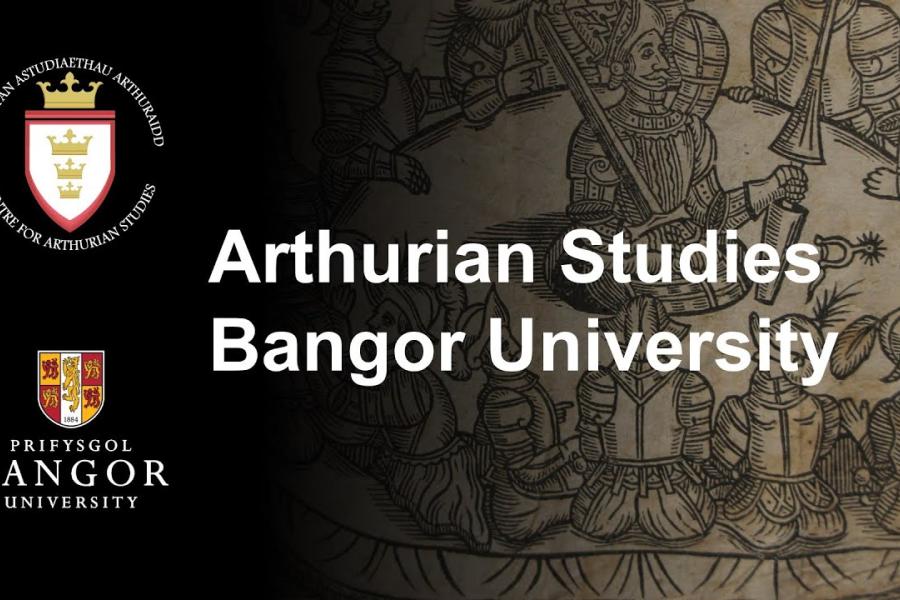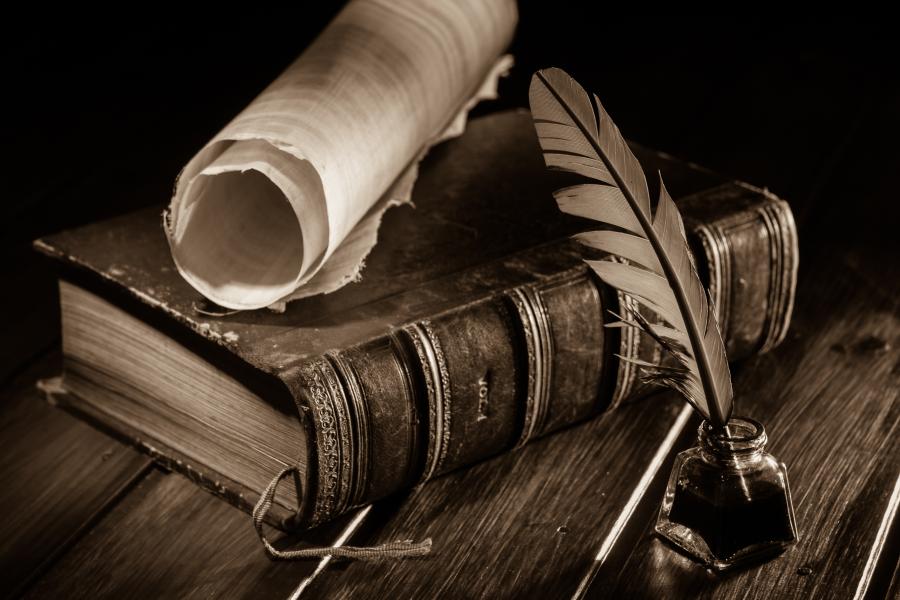About This Course
Our MA Arthurian Studies explores insular (Britain and Ireland) and Continental medieval traditions of Arthurian writing from the inception of the legend (perhaps as early as the 6th century) to the present day. Students may engage in deep comparative study of Latin, Welsh, Irish, Breton and English/French texts, with the additional advantage of studying other linguistic traditions, if necessary in modern English translation.
Our experts teach on such subjects as Welsh and ‘Celtic’ mythology, including its dissemination and reception in modern mystical traditions and wider thought (Aled Llion Jones, Jerry Hunter, Peredur Lynch); the adaptation of Welsh material in modern fiction (Jerry Hunter, Andy Webb); the representation of women, sex and death in medieval literature (Sue Niebrzydowski); medieval English and French romance and chronicles and the medieval manuscript, and the adaptation of medieval motifs in the 19th c and beyond, including editing texts (Raluca Radulescu); Shakespeare, myth in the early modern period (Andrew Hiscock); adaptation of Welsh legend from the 16th to the 19th c. (Jerry Hunter), Romantic medievalism (Carol Tully), Victorian medievalism (Karin Koehler); and modern and contemporary literature (Andy Webb), and film (Greg Frame). Applicants may also work with one of our creative writers to include creative writing in their portfolio of work.
Background
Arthurian Studies is an established area of expertise at Bangor University. A long-standing record of teaching, research and publication attests to its vitality.; the main specialists in the field are Prof. Raluca Radulescu, whose work has focused on Malory, Arthurian romances and chronicles, especially through a cultural approach, and Professor PJC Field, currently President of the International Arthurian Society, and world-renowned for his work on the Arthurian legend through the centuries. This course also draws upon expertise available in other periods of literature within the College of Arts, Humanities and Social Sciences, ranging from post-medieval approaches, or medieval Welsh, History and Archaeology, and Music. Staff in these areas contribute regularly to the teaching of Arthurian topics ranging from the medieval period to the present, including music and modern film adaptations.
Why Bangor for Arthurian Studies?
The attractiveness of the MA Arthurian Studies here at Bangor University lies in its flexible, though comprehensive, approach to the study of this area. Students may choose to specialise in either the medieval or the post-medieval period but they will be required to take both modules with these titles in order to benefit from the wide coverage of the Arthurian legend they provide. Students are encouraged to participate in the activities of the Centre for Arthurian Studies, including the annual international postgraduate conference, ‘Medievalism Transformed’ and the bi-monthly Institute for Medieval and Early Modern Studies seminar series .
Bangor University provides:
- a long-standing and continuing tradition in excellent teaching and internationally-recognised research. Professor Raluca Radulescu is currently the elected Vice-President of the International Arthurian Society; several members of staff are leading authorities in Welsh and Celtic studies, including the Mabinogion, prophecy and post-medieval Arthurian literature.
- unique holdings in Arthurian Studies - with a collection going back to the inception of the university in 1884 and enhanced by the donation of the Flintshire Harries Arthurian collection of rare books in 2014.
- a location with its roots in the earliest legends, anchored in a vibrant local environment of story-telling and creative practice including the legends.
- opportunities to build a unique portfolio of modules under this programme, to include skills ranging from dealing with early books and manuscripts; publishing; or heritage.
- strong connections with the National Library of Wales and the John Rylands Library, Manchester, respectively, where important sources and rare manuscripts and printed books relevant to the course are located.
- a dedicated space space for the Centre for Arthurian Studies in the Main University Library - it is a study and teaching room, where items from the Flintshire Harries Arthurian Collection can be consulted.
- Training in medieval manuscript studies (palaeography and codicology of medieval manuscripts), early printed books, the history of the book in the post-medieval period, as well as publishing, creative writing and heritage are also offered, to complement the core Arthurian content of the course.
Programme Length
MA: 1 year full-time; 2 years part-time.
Research Opportunities
A collaboration with the tourist attraction ’King Arthur’s Labyrinth’ at Corris has led to fully funded Access to Masters MA places on this degree programme. The course also maintains links with people and organisations beyond Bangor: these might include guest speakers and visits to sites of literary interest.
Please introduce yourself.
Hi, I'm Raluca Radulescu, I'm a professor in medieval literature here at Bangor University and the Director of the Centre for Arthurian Studies, and of the Arthurian MA.
Tell us about the MA in Arthurian Studies
The MA in Arthurian studies has been running at Bangor University for over 20 years but also before that for nearly 40. It is a very international program that brings together expertise in Arthurian studies, in Celtic studies, in Welsh history and it's really grounded in the Legends and the land. Here in Bangor, we are not only based in the place where the legends originated, but we also utilize our expertise in a number of fields including in English literature, in Welsh literature, medieval to modern Welsh history, heritage, publishing. So, we're looking at the global phenomenon that the Arthurian myth has become, and we're looking at different translations in different languages from French, German, Italian, and way beyond up to the modern novel and indeed modern media.
What makes the MA so special?
The MA in Arthurian Studies at Bangor is special because it brings together not only the expertise of those who teach it, but also those who research different aspects of the legend. My own interest in the legend stems from my expertise in medieval English literature, in particular the chronical aspects, how Arthur was talked about in the medieval chronicle known as The Brut, going all the way back to the mythical founder of Britain talked about by Geoffrey of Monmouth in his Historia Regum Britanniae, Brutus, and how the Arthurian story brings together different strands of a national myth and a national story about conquest but also of civilization, of bringing courtly values to this part of the world.
I'm interested in that as well as in the work of Sir Thomas Mallory, the 15th century author who wrote during the Wars of the Roses, and how his text Le Morte d'Arthur, the death of Arthur, provides the one single long prose account of the rise and fall of the round table under the leadership of King Arthur. In other words, being the longest text in the English language from the Middle Ages that influences generations of writers and readers and is owned and enjoyed for centuries up to the 21st. So, my own expertise is in the work of Sir Thomas Mallory the 15th century author who brought together different strands of the Arthurian story into one long prose account in the English language which has become, to the present day, one of the most popular and enduring versions of the Arthurian myth.
In particular I can work here at Bangor University and the students I teach can use the collections, including this example of the last early modern printed edition of Le Morte d'Arthur from 1634 printed by William Stansby in London. It is an example of a late, one might say, edition of the 15th century text, so in the 17th century we still have the gothic type, the black letter alongside utilizing a woodcut introduced first by Wynkyn de Worde, William Caxton’s apprentice for the printing of Le Morte d'Arthur.
Alongside that I'm really interested in the publishing history of Arthurian texts, be they of Mallory’s Le Morte d'Arthur, or other ones including for example stories or antiquarian interest in the historicity of Arthur, so the reprinting or the printing and editions of Gildas and Nennius in the early 16th century, we have an example here from the Flintshire Harries Collection, or indeed beautiful examples of the golden age of illustration and of publishing history Le Morte d'Arthur reprinted in the early 20th Century with its original wood cuts from Wynkyn de Worde but in in modern type. Or indeed exploring how in the 18th century Charles Bertram not only printed Gildas and Nennius in his
efforts to inscribe himself in the history of Arthurian studies as an antiquarian, but he also forged a text about King Arthur and put his name into the book as the editor of these texts.
There are several special things about studying a Bangor for an Arthurian MA, and definitely one that comes to mind is being part of the community of scholars who enjoy being in the locations where the Arthurian myth came into being, where it was written down, and working alongside those who specialize whether it is Celtic archaeology, Celtic legend and myth, Welsh medieval history or indeed the publishing history of these books. At Bangor University we hold one of the most important collections of Arthurian books in the UK and in Europe and we're very lucky to have this collection for our use on the MA and with our PhD students.
In particular I'd like to highlight the fact that we constantly work with the community, we get donations, and we organize a number of events that involve our students in contact with the latest research in the field. We have events that our students get involved in whether they present their research where they're part of an international reading group as we are at the moment, whether they help with various exhibitions or community engagement events. There are plenty of opportunities to develop not only academic skills, perhaps publish in the Journal of the International Arthurian Society, or indeed to develop skills in relation to a future profession, a future job be it in heritage, in the media, or something else that is related.
In other words what we do at Bangor university we provide a very full and complex education that prepares you for the world the world of today involves not just knowing how to read and analyse these texts and how to enjoy how myth goes on and inspires, it is also about providing this enduring legacy as a fruitful avenue for further reading and further research whether it is by the young in children's fictions or whether it is by the general public be it in film or in journalism the Arthurian MA at Bangor University provides all of these opportunities and much more.
Course Content
What will you study on this course?
The MA in Arthurian Studies offers a carefully chosen programme of modules to guide you through this rich, interdisciplinary field of investigation and to prepare you for research at an advanced level. The programme consists of two parts: Part One (taught) must be successfully completed before proceeding to Part Two (the dissertation). Students will complete 180 credits, comprising 120 credits taught modules and a dissertation (60 credits).
During semesters 1 and 2 students will typically take the following compulsory modules:
- Medieval Arthur: which exploring the Arthurian myth from the earliest archaeological evidence to the end of the fifteenth century, with a view to examining its evolution in a variety of the socio-political and cultural contexts, as well as material culture. Genres studied on this module will include historical documents, chronicles, romance, genealogy, written in Latin, Welsh, English, French, German, Dutch, Norse, Italian, Spanish (in translation, as needed), that is, all the languages in which Arthurian material was created and circulated.
- Post-Medieval Arthur: which addresses the adaptations of Arthurian myth and legends from the sixteenth- to the twenty-first century, paying attention to the way the story was shaped in different genres, from popular romance, pastoral, drama, epic, and satire to modern fantasy, the graphic novel, video games and film.
Students will also select a further optional modules from a list that may include:
- Material Texts & Editing: a module exploring the rich field of working with texts - from manuscripts in the early medieval centuries to screenings in the digital age. Students have the opportunity to meet for seminars in the University archives department and to work with a team of practising academics showcasing their research experience with writings from the eighth to the twenty-first century.
- Manuscript and Printed Books: an introduction to the study of medieval and early modern palaeography and codicology, in co-operation with the Bangor University Archives and Special Collections, which include the library of Bangor Cathedral.
- Other options may include: Creative Writing: Poetry, Creative Writing: Prose, Critical Theory, Practice and Research, Understanding the Middle Ages, Creation of the Modern Celt* and The Celt: Celtic Institutions*.
For Part 2 of this course students will progress to the dissertation element, which runs across the summer. Students will be able to select either the Postgraduate Dissertation, or the Creative Writing Dissertation. The dissertation represents the culmination of the programme of study in the production of either a substantial piece of scholarly research (Postgraduate Dissertation) or a substantial piece of creative writing (Creative Writing Dissertation). Students will be supported by an academic supervisor with meetings to discuss ideas, resources, approaches and final drafts of the dissertation.
*Welsh-medium version available
Entry Requirements
Applicants should normally hold a 2(ii) undergraduate degree in a relevant area, demonstrating high achievement in elements relevant to the proposed research or equivalent experience. In their applications, students should outline the area in which they wish to specialise.
International students whose first language is not English: An IELTS score of 6.5 with no element below 6.0 is required.
Careers
Current and past research students have engaged in higher degrees, teaching, research and librarianship in higher education, publishing, and a range of related activities. Kevin Whetter is now Associate Professor at Acadia University, Canada, and has co-edited Re-Viewing Le Morte Darthur (Cambridge: DS Brewer, 2005); Dr Takako Kato is Research Associate at the Centre for Textual Scholarship, De Montfort University, and her study Caxton’s ’Morte Darthur’: The Printing Process and the Authenticity of the Text, was published at Oxford in the Medium Aevum monograph series, in 2002; Professor Yuri Fuwa teaches at Keio University, Japan; Dr Michael Cichon is Professor at the University of Saskatchewan, Dr John Joseph Doherty works in a US university library, and Dr Mark Adderley is Professor of English at Missouri Valley College.




